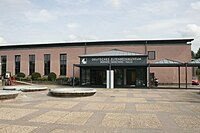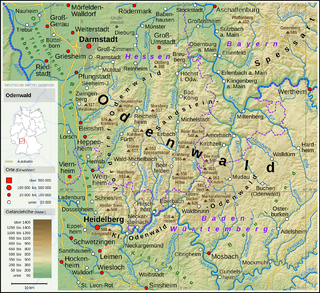
The Odenwald is a low mountain range in the German states of Hesse, Bavaria and Baden-Württemberg.
The Odenwaldkreis is a Kreis (district) in the south of Hesse, Germany. Neighboring districts are Darmstadt-Dieburg, Miltenberg, Neckar-Odenwald-Kreis, Rhein-Neckar-Kreis and Kreis Bergstraße. Odenwaldkreis belongs to the Rhine Neckar Area.

Heppenheim (Bergstraße) is the seat of Bergstraße district in Hesse, Germany, lying on the Bergstraße on the edge of the Odenwald. It is best known for being the birthplace of Sebastian Vettel, a four-time Formula One World Champion and the place of founding of the Free Democratic Party (Germany).

Michelstadt in the Odenwald is a town in the Odenwaldkreis (district) in southern Hesse, Germany between Darmstadt and Heidelberg. It has a population of 28,629 people.

Ivory carving is the carving of ivory, that is to say animal tooth or tusk, generally by using sharp cutting tools, either mechanically or manually. Objects carved in ivory are often called "ivories".

Johann Philipp Ferdinand Preiss was a German sculptor. He was one of the leading sculptors of the Art Deco period.

Erbach is a town and the district seat of the Odenwaldkreis (district) in Hesse, Germany. It has a population of around 13,000.
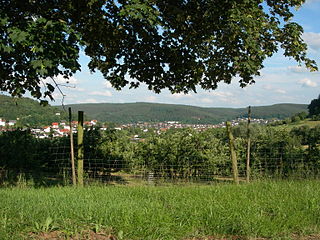
Höchst im Odenwald is a municipality in the Odenwaldkreis (district) in Hesse, Germany.
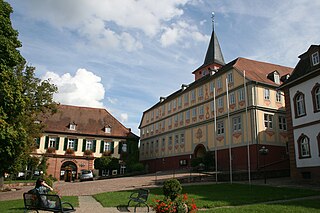
Bad König is a town and resort (Kurort) in the central Odenwald in the Odenwaldkreis (district) in Hesse, Germany, 29 km southeast of Darmstadt.
Beerfelden was a town in the Odenwald in the Odenwaldkreis (district) in Hesse, Germany, 28 km northeast of Heidelberg. On 1 January 2018 Beerfelden, Hesseneck, Rothenberg and Sensbachtal merged to create the town Oberzent.
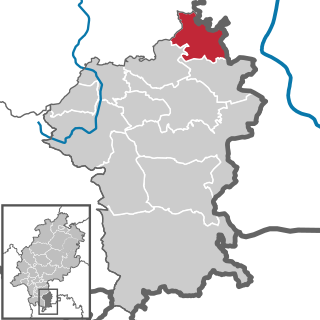
Breuberg is a town in the Odenwaldkreis district of Hesse, Germany. It is 28 km east of Darmstadt and 20 km southwest of Aschaffenburg.

Limbach is a town in the district of Neckar-Odenwald-Kreis, in Baden-Württemberg, Germany.
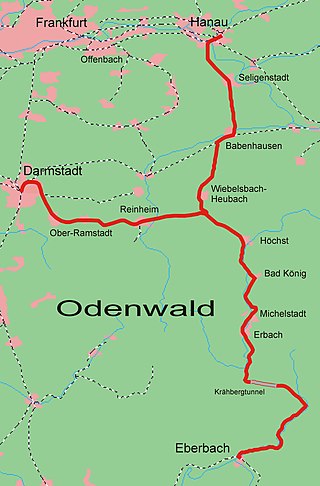
The Odenwald Railway is a mainly single-tracked main line from Darmstadt and Hanau to Eberbach on the River Neckar, which crosses the Odenwald mountains in the German states of Hesse and Baden-Württemberg. Since 1882 the route has been operated throughout as a standard gauge line and since 2005 has been worked by diesel multiples owned by the VIAS private railway company.
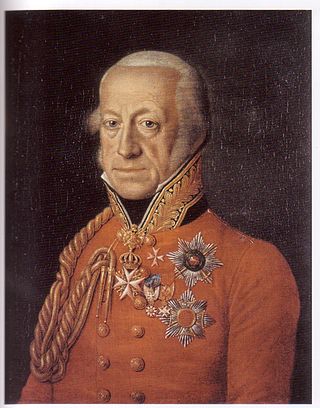
Franz Graf zu Erbach-Erbach was a German nobleman and art collector.

Erbach Palace is a palace in Erbach im Odenwald and the seat of the Count of Erbach. It was originally built in the Middle Ages, but most of the buildings today date back to the early 18th century. The palace houses the extensive antique collection of Franz, Count of Erbach-Erbach.

The Mümling is a river of Hesse and Bavaria, Germany. It is 49.7 kilometres (30.9 mi) long and lends its name to the Mümlingtal in Odenwald. In Bavaria it is sometimes called Mömling in official documents. It is a left tributary of the Main.
Jan Holschuh was a German sculptor and a designer. He was one of the leading contemporary ivory carving artists. Many of his ivory sculptures are housed in the German Ivory Museum Erbach. During his lifetime, he produced more than 200 sculptures from elephant ivory, mammoth ivory fossil, and amber. He won many awards, including the Grand Prix of 1929 Barcelona International Exposition and State Prize Munich in 1966.

Darmstadt Nord (north) station is a junction station in the city of Darmstadt in the German state of Hesse. The passenger station, which is served by trains of the Odenwald Railway and the Rhine-Main Railway (Rhine-Main-Bahn), has four platform tracks. Running parallel and north of the station are two additional tracks for freight traffic.

The Helm of Cannae is an artefact in the antiquities collection of Franz, Count of Erbach-Erbach, at Erbach Palace in Erbach im Odenwald. It is, reputedly, one of the few surviving helmets from the field of the Battle between the Roman Republic and the Carthaginians under Hannibal in 216 BC. It is most famous for a legend about its acquisition by the count.
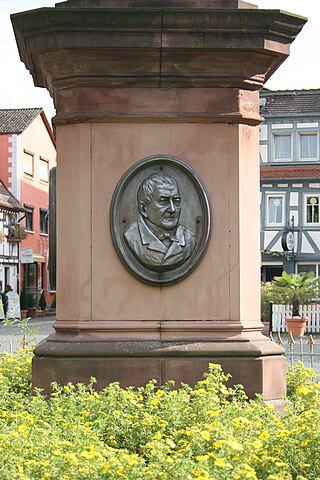
Christian Wilhelm Karl Kehrer of Erbach was a German hunting and animal painter, court painter and archivist.
